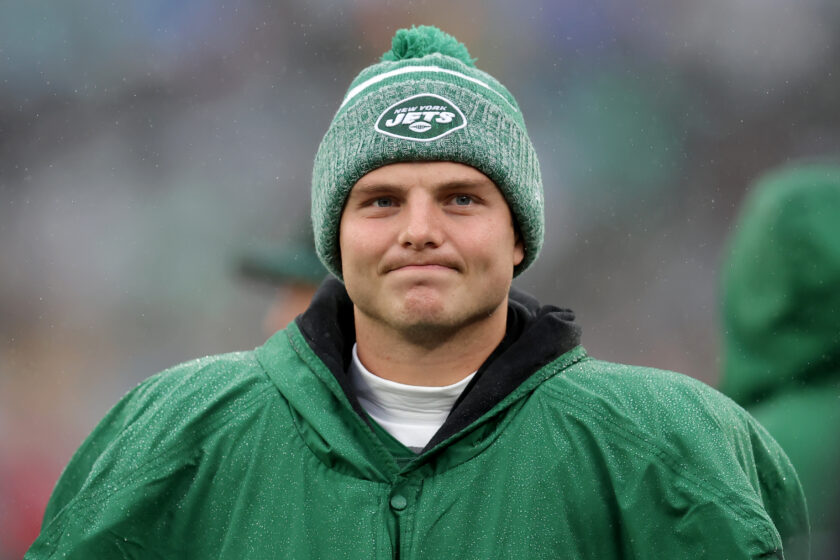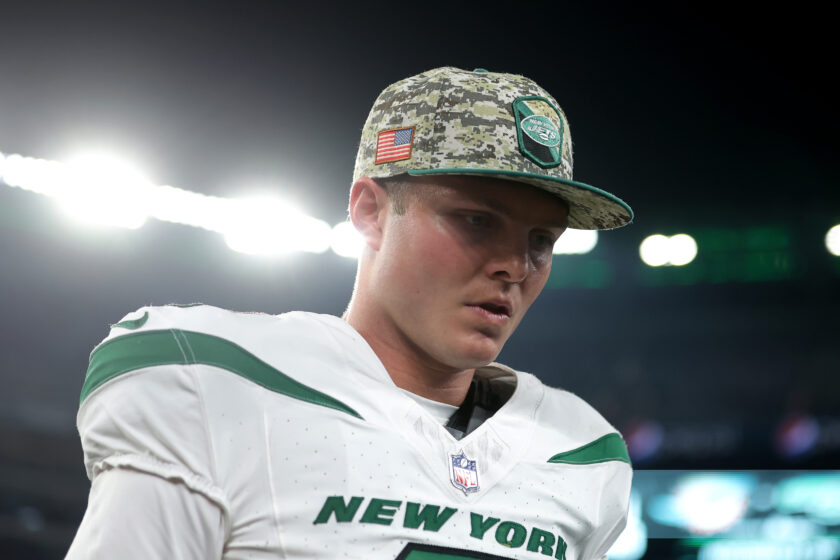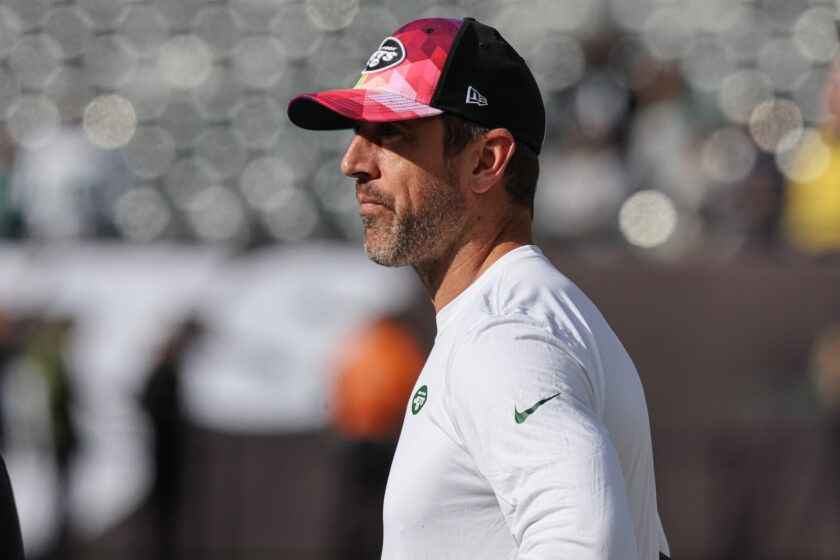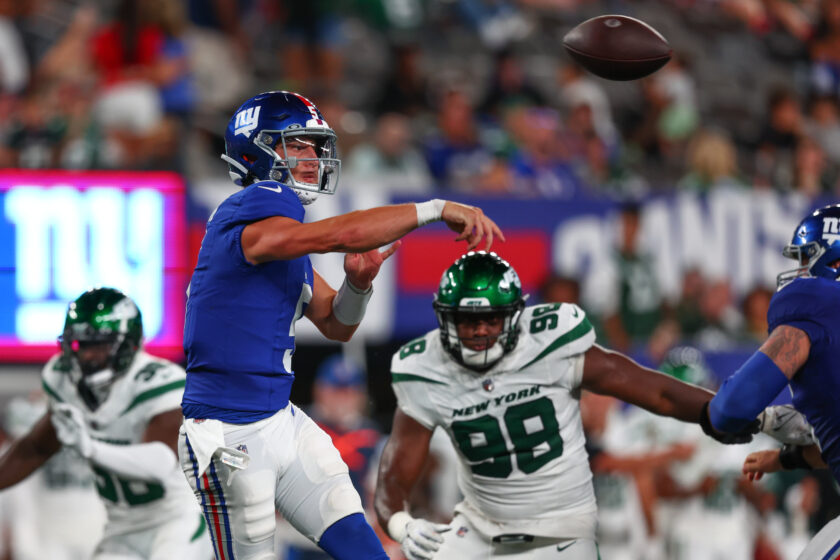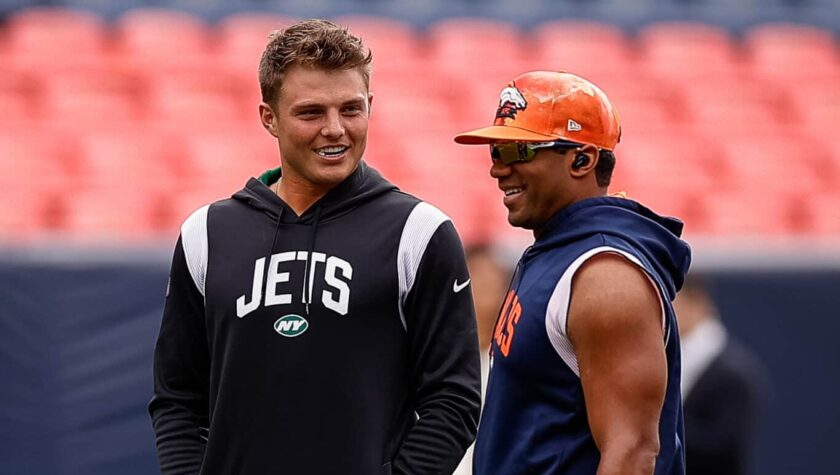No question about it — the Jets must draft an offensive weapon at No. 23 overall
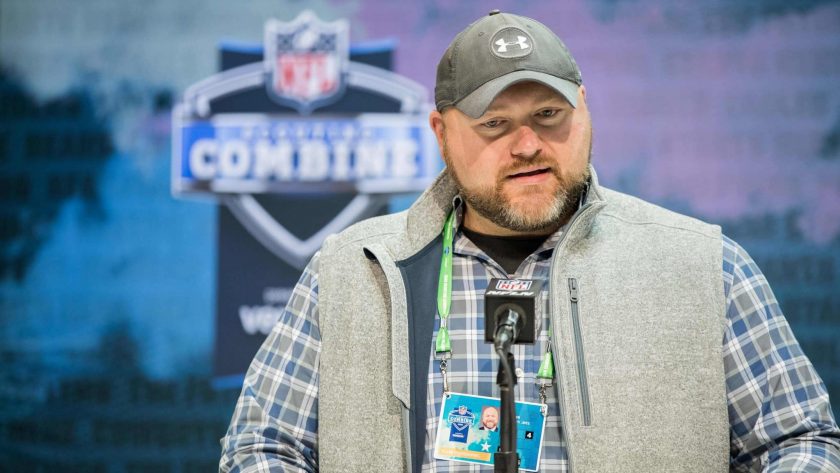
The Jets can’t overthink it. They need to draft an offensive weapon with their late first-round pick this year.
[sc name=”ryan-honey-banner” ]Obvious; anticipated; presumptive.
Yes, the adjectives to describe the Jets‘ pending selection of BYU quarterback Zach Wilson at No. 2 overall in the upcoming draft. Them eventually acquiring the young signal-caller has essentially been the narrative for quite some time — it was basically confirmed with the recent trade of Sam Darnold to the Panthers.
While many believe the 49ers could choose Alabama quarterback Mac Jones with the third overall pick, that pending selection isn’t as crystal clear as Gang Green’s is. The annual draft truly starts at No. 3; no one will be surprised by what the Jets do with their prestigious choice.
But lucky for the organization (and thanks to the 2020 trade of Jamal Adams to Seattle), the Jets additionally own the No. 23 overall pick in the back half of the opening round.
What they do with that valuable resource remains a mystery, but there’s only one right answer to the question of what route they should take next Thursday night — draft an offensive weapon.
Remain patient with the defensive picks
No, the defense’s 2020 rankings in major statistical categories weren’t ideal, to say the least. But improvements on that side of the ball are already on the way.
Free-agent pickup Carl Lawson will boost the pass rush at the defensive end position, linebacker Jarrad Davis should be a reliable complement to C.J. Mosley (who’s anticipated to return following his 2020 opt-out), and Marcus Maye is one of the more talented young safeties in this league.
The Jets aren’t desperate for a defensive weapon to the point where they absolutely need to utilize their late first-round pick to acquire one. They could wait until the No. 34 pick to draft a talented edge rusher to assist in the development of this defense — there’s a chance Penn State’s Jayson Oweh or Oklahoma’s Ronnie Perkins could drop to the second round. Heck, some (not me) believe Miami’s Gregory Rousseau won’t be off the board until the second round, so the talented pass rusher could also be an option at No. 34.
Maybe Virginia Tech cornerback Caleb Farley drops to the Jets in the second as well?
Drafting a defensive playmaker at No. 34 is totally possible, and don’t think it wouldn’t be a beneficial move just because the player wouldn’t have that “first-rounder” label on him.
Of course, you can say the same of the opposite route and suggest they could grab a defensive player at No. 23 and still cash in on a receiver that drops to No. 34 (this wide receiver class is deep).
However, that brings us to our next point…
The development of Zach Wilson trumps all
Don’t forget, the Jets will most likely be rolling the dice with a rookie quarterback from day one, a move that hasn’t been all too common in recent years.
Justin Herbert didn’t start right away. Tua Tagovailoa didn’t either.
Lamar Jackson didn’t, Baker Mayfield didn’t, and of course, Patrick Mahomes didn’t.
When Week 1 rolls around in September, the Jets will be relying on a 22-year-old kid who had one year of significant collegiate production at a non-Power 5 school to help improve an offense that was last in scoring, total yards, and second-to-last in passing just last season.
He won’t be able to do it all on his own, and if the Jets are going to make the type of investment in Wilson that they’re slated to make, his development will need to be one of the top focal points.
In order to find efficient on-field improvement, Zach will need a consistently reliable slate of weapons — the Jets have improved that group with the free-agent acquisitions of wide receivers Corey Davis and Keelan Cole, but that may not be enough.
Utilizing a pick such as No. 23 to ensure the Jets can get the top receiver or running back available at that point in the draft would assist in the eventual improvement of both Wilson and the offensive unit as a whole.
So, receiver or running back? Pick one
Obviously, the former option is more intriguing than the latter — this may annoy some old school football fans, but the NFL has become a passing league, plain and simple.
A receiving corps that includes Corey Davis, Jamison Crowder, Keelan Cole, Denzel Mims, and a draftee such as Elijah Moore (Ole Miss), Kadarius Toney (Florida), Terrace Marshall Jr. (LSU), or Rashod Bateman (Minnesota) would be a scary group to defend, as we’ve stated numerous times.
Selecting a running back at No. 23 may not be a superb value pick for New York, so don’t expect the organization to do so unless general manager Joe Douglas falls in love with Alabama’s Najee Harris or Clemson’s Travis Etienne, should one or both be available by the time the Jets are on the clock.
- DRAFTKINGS SPORTSBOOK
BET $5 & GET $150 IN BONUS BETS INSTANTLY!
- FANDUEL SPORTSBOOK
BET $5, GET $150 BONUS!
- CAESARS SPORTSBOOK
$1,000 BET ON CAESARS!
- BETMGM SPORTSBOOK
BET $5, GET $158 BONUS!
- BET365
GET $150 BONUS OR $2,000 FIRST-BET SAFETY NET!






